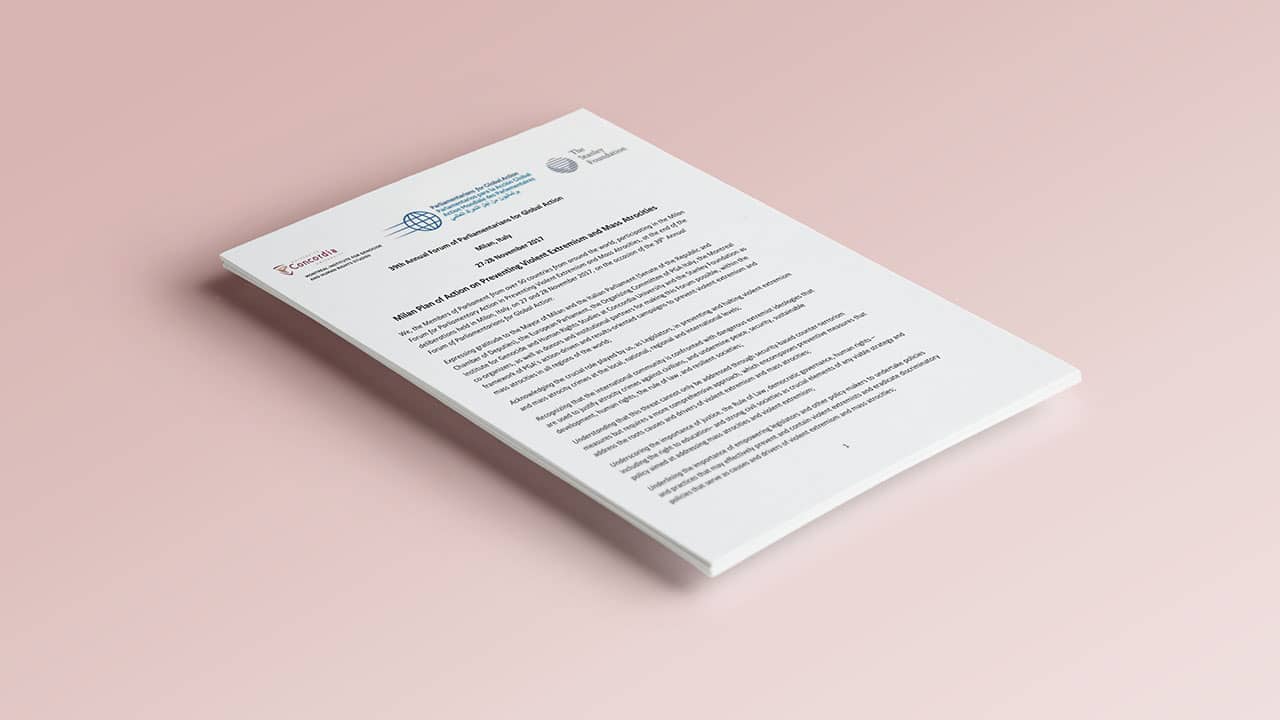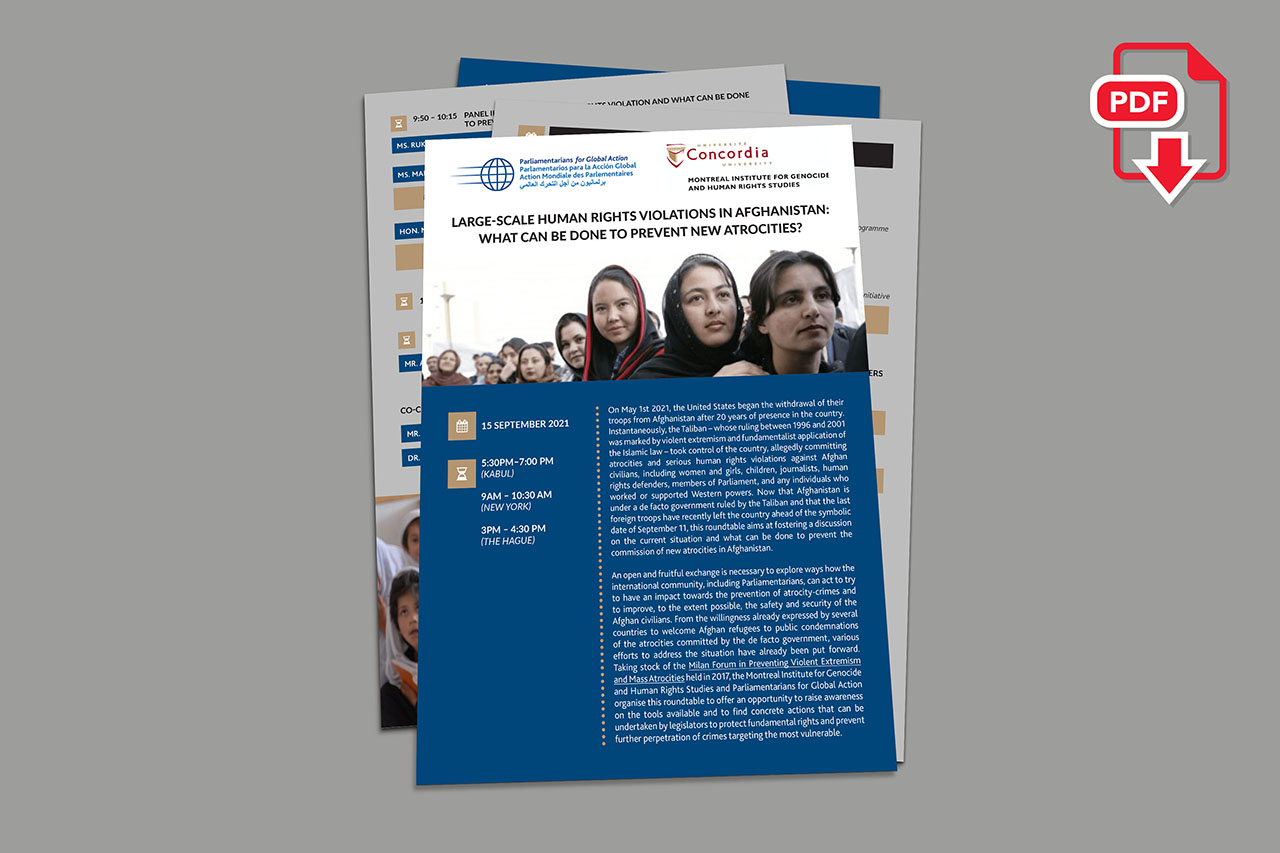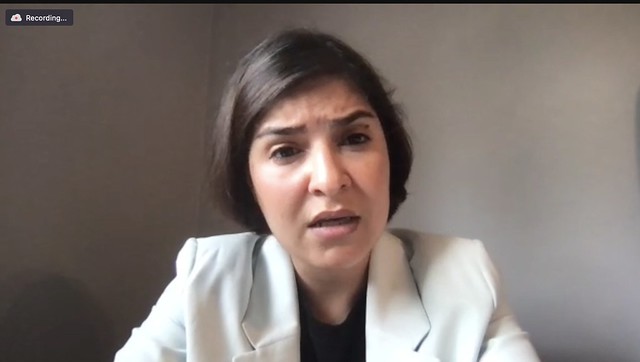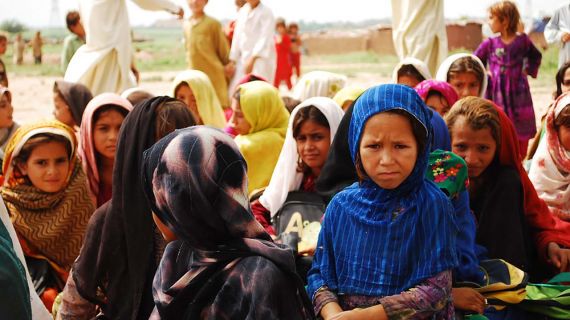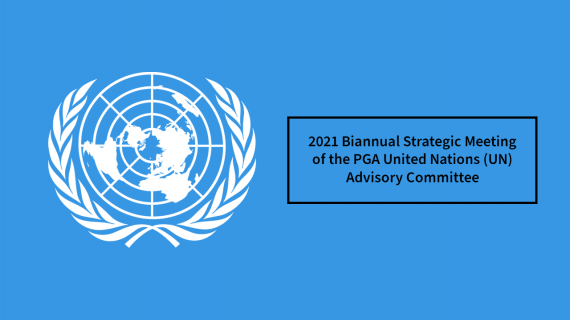On 15 September, only a few days after the 20th anniversary of the 11 September attacks, Parliamentarians for Global Action (PGA) and the Montreal Institute for Genocide and Human Rights Studies (MIGS) held a closed roundtable with the active participation of Members of Parliament (MP), human rights defenders, women’s rights activists, and other experts and academics. The roundtable explored actions that could be undertaken by the international community which could have an impact toward the prevention of atrocity crimes and improve, to the extent possible, the safety and security of Afghan civilians. The following document seeks to highlight the outcomes and to propose action points that were raised during this fruitful exchange.
The roundtable, co-chaired by Dr David Donat-Cattin, PGA Secretary General, and Mr. Kyle Matthews, MIGS Executive Director, opened with Hon. Kasthuri Patto, MP (Malaysia) who raised concerns regarding the current violations committed against Afghan civilians and urged the Taliban to respect the human rights obligations that are legally binging on Afghanistan. Criticising the ousting of her Afghan colleagues from their democratically elected position at the Parliament by the unconstitutional change of government imposed by the Taliban, Hon. Patto announced the decision of PGA’s Board to continue to recognise their Afghan Members as PGA Members until the end of their constitutional mandate, therefore symbolically recognising them as the legitimate representatives of the Afghan people.
Lt.-Gen. Roméo Dallaire, former Canadian Senator, MIGS’ Disitinguished Senior Fellow and Commissioner to the Principles for Peace Initiative, then addressed the audience. Lt.-Gen. Dallaire raised the failure of the United States and its allies to anticipate and understand the complex realities and frictions in the Afghan society, which only enabled the conflict to evolve for almost 20 years. He encouraged legislators to create coalitions of like-minded colleagues from different parties and houses throughout their Parliament to work together toward the prevention of mass atrocities and stabilisation. Lt.-Gen. Dallaire stressed that the role of Parliamentarians was to support, to assist, to provide insights and to help build States in the best interest of human rights and establish lasting peace.
The first panel started with Mr. Chris Alexander, former MP (Canada) and former Ambassador of Canada in Afghanistan, who criticised the failures to achieve stabilisation and peace in Afghanistan, stressing two driving factors, namely, the role of Pakistan and of the United States. According to Mr. Alexander, Pakistan played a role in supporting the Taliban through a proxy war in Afghanistan while the ‘war on terror’ led by the United States was only a pretext to undertake military operations. Ultimately, it only fostered instability, led to human rights violations, and failed to build a viable justice system in Afghanistan. To put an end to the current situation, Mr. Alexander notably proposed to enforce UN sanctions against Taliban and al-Qaeda leaders; to isolate the Taliban (i.e. the self-proclaimed Islamic Emirate) and their allies; to support remaining legitimate institutions in Afghanistan, if any; and to monitor the commission of atrocities.
Hon. Syed Naveed Qamar, MP (Pakistan) and Chair of PGA International Council, proposed to look at the situation on the ground and argued that neither military operations nor the imposition of sanctions were viable options anymore. Recognising Afghanistan’s dire need of humanitarian and economic support and the potential collapse of the system if no assistance was provided, Hon. Qamar argued that the international community should not isolate the Taliban but instead negotiate with them, without formally recognising their government. He suggested States’ mobilisation at the UN level and the establishment of a roadmap on how best to ensure the provision of aids and support in Afghanistan. Hon. Qamar further urged the de facto government of Afghanistan to include minorities and women in its leadership structure.
During the second panel, Professor Mohamed Elewa Badar, Professor of Comparative and International Criminal Law & Islamic Law at Northumbria University, offered an overview of the application of fundamental Sharia Law and its impact on human rights. Professor Badar stressed that the Sharia purportedly imposed by the Taliban was only its distorted image, which limited Sharia Law to inhumane punishments that could transform a country into a community of mutilated persons and to the international crime of gender-based persecution with disregard to social justice and people’s human rights. Underscoring that Taliban were not only violating international law, but were also breaching Islamic principles, Prof. Badar urged the Muslim and Arab communities to raise their voices and to call for the establishment of a special court to prosecute Taliban based on Islamic Law principles (without prejudice to the complementary jurisdiction of the ICC), and deconstruct the narrative imposed by the Taliban thus far.
The third panel opened with Ms. Rukhsar Azamee, Media Officer at the American Branch of the International Law Association (ABILA) and a former producer for Tolo News channel in Afghanistan, who brought a personal perspective and offered a testimony of her reality and the one of her family members who were still in Afghanistan at the fall of Kabul on 15 August. Stressing that her story was only one of many other women, Ms. Azamee addressed the bravery of all Afghan women who were trying to protest despite the danger they were facing in Afghanistan. Recalling the anxiety and pain she had to go through when her family took a journey to flee Afghanistan, Ms. Azamee wondered what was the cost of peace, especially if the peace was made with alleged perpetrators of mass atrocities.
The last speaker of the roundtable was Ms. Mariam Safi, Founding executive director of the Organization for Policy Research and Development Studies who addressed how the current situation was predictable but had been ignored by the international community. In fact, in July of this year, Afghan women living in areas controlled by the Taliban were already banned from work, forced to marry their daughters to fighters while primary and high schools were shut down. Ms. Safi criticised the failure of the peace process, which only brought her country into destruction and mass atrocities. She observed that women’s rights were disappearing and that this tangent would only continue as the Taliban further defined what they meant by ‘women’s rights as per their application and own interpretation of the Sharia Law’.
Finally, Dr David Donat-Cattin, criticising the absence of actions undertaken by the UN Security Council, stressed the importance to act now as the values enshrined in the UN Charter were still the values of humanity. On behalf of PGA and all those believing in the Rule of Law, peace, stability, and security, he urged to put an end to the global ‘war on terror’, which has been characterized by policies and practices that PGA has qualified as counter-productive, ineffective and more often than not illegal[*], and to bring back justice in the hierarchy of values of the international community.
PGA wishes to stress its gratefulness for the help that the PGA National Group in Pakistan has been giving to asylum seekers and refugees and those trying to cross the border.
Recognising that while terrorism, including international terrorism, is one of the most visible and perceived manifestations of violent extremist groups, these groups are also perpetrating atrocities that must be qualified as the most serious crimes of concern to the international community as a whole, namely: (1) genocide, (2) crimes against humanity and (3) war crimes, including the destruction of cultural heritage sites, and (4) the crime of aggression, regarding which effective prosecutions may be facilitated by the application of general principles of international criminal law (i.e., non-applicability of statutes of limitations and of the defense of superior-order, command responsibility or responsibility of the superior, irrelevance of official capacity, prohibition of amnesties and other impunity measures, obligation to prosecute and extradite or surrender to the International Criminal Court);
Violent retaliation in the form of “decapitation” and elimination of violent extremists pursued via extra-judicial or summary executions, including targeted killings, are outside the justice framework, inconsistent with International Law, perceived as an exercise of vendetta, and extremely ineffective. These strategies encourage recruitment into some violent extremist groups that promote a self-styled notion of ultimate sacrifice or “martyrdom.” Excerpt from the Milan Plan of Action (2017)
ACTION POINTS
This roundtable offered a rich exchange and concrete ideas and strategies to try to prevent new atrocities and minimise the attacks committed against the Afghan people, including women, girls, boys, and minorities. The following actions should be taken into consideration by the international communities, including Parliamentarians, moving forward:
- Never forget Afghanistan and continue the discussion: Extend and expand the network to continuously remind the international community of the obligations to protect and promote human rights, notably through the establishment of a follow-up strategic Working Group gathering activists, experts, organizations, social groups, Think Tanks, opinion leaders and Members of Parliament from all around the world.
- Bring back justice as a priority: Urge the Office of the Prosecutor of the International Criminal Court to advance concrete investigations and the swift opening of symbolic cases on the alleged crimes against humanity, including gender-based persecution committed under the Taliban’s extremist interpretation of the Sharia Law, and war crimes committed on the territory of Afghanistan or by its nationals since 1 May 2003 onward.
- Strategically direct the humanitarian aid and support to Afghan civilians and civil society: Afghan people are in dire need of humanitarian aids. This support, however, should not be directed to the Taliban de facto government, but should be directly sent to the local associations and beneficiaries. We must think about new strategies to put in place to ensure that associations of professionals (e.g. in the field of health-care, engineering and architecture for reconstruction, lawyers and jurists et alia, using the support-model for the civilian associations that resisted against the dictatorship of Al Bashir in Sudan until 2019), civil society organizations, women’s groups, youth’s groups, and other grass-root organisations receive direct humanitarian aid to better support the people on the ground.
If international organisations, such as the World Bank, the UN or the World Food Program were to send assistance to the interim government, the international community must be convinced that the Taliban regime has been upholding the rights of all citizens and put in place transparency and accountability measures to ensure that human rights violations are prevented and punished. - Do not recognise the Taliban government as the official government, but use it as leverage: To recognise the Taliban regime as an official government would be to recognise a government that has been forcibly imposed on Afghan people and which is not representing them. However, the international community should use this intention by the Taliban to be internationally recognised as leverage to ask the Taliban for the respect of human rights, starting with the rights of women and minorities, to put an end to gender-based persecution and enslavement, and to uphold Afghanistan’s existing international obligations.
- Support the monitoring, documentation and collection of violations of international humanitarian law, international criminal law, and human rights law allegedly committed in Afghanistan: Support the work of NGOs and other actors who are currently monitoring, documenting, collecting and preserving evidence of the atrocities being committed by the Taliban since 15 August 2021, and before, as well as by any other actor that perpetrated inhumane acts against the civilian populations.
- Call for the establishment by the UN Human Rights Council of an independent international investigation mechanism, such as an Independent Fact-Finding Mission on Afghanistan: An independent mechanism should be put in place to monitor and document the alleged violations committed by the Taliban against Afghan civilians, including women, girls, journalists, members of parliament, human rights and women rights defenders. Under binding norms of International Law, it would be unacceptable to characterize the situation in Afghanistan as falling under the principle of non-interference in the internal affairs of a State in light of the gravity of the alleged human rights’ abuses and their long-term impact, which constitutes a threat to international peace and security in the meaning of Article 39 of the UN Charter.
- Monitor the implementation, or lack thereof, of the public promises made by the Taliban to the Afghan people and the international community: To put pressure on the de facto government, breaches of the pledges made by the Taliban should be monitored, documented, and called out in public fora. The Taliban should notably be urged to establish an inclusive government which considers the multifaceted society of Afghanistan and to fully respect the rights of women.
- Have a critical reflection on the imposition of sanctions, learn from past mistakes and put an end to the revengeful policies of the global “war on terror”: While views during the roundtable were divergent regarding the imposition of sanctions – whereby individual sanctions such as the freezing of assets shall still be used as leverage against the Taliban leadership –, it is paramount to be self-critical on the failures of the so-called ‘war on terror’ and to acknowledge the counter-productivity, ineffectiveness and questionable legality of the techniques used, especially the so called ‘targeted killings’, which ultimately failed to prevent the commission of new atrocities, led to further hatred and revenge, and helped the Taliban, ISIS and other extremists to find fertile grounds for their recruitment efforts. Parliamentarians and other actors should jointly raise their voices and recall that this is only through the respect of the Rule of Law that the international community can aim to a sustainable peace. Suspected authors of atrocities shall be arrested and brought to justice, not executed without a trial. Victims of such atrocities must have access to truth, justice and reparations.
- Put pressure and resources in the government to facilitate the urgent evacuation of Afghan civilians at risk: Put in place urgent measures to facilitate the obtention of temporary status for people applying for resettlement as well as for asylum seekers and refugees.
- Support and advocate for activists, women’s groups and women’s rights defenders: Afghan women who are in immediate danger due to their work or former work should be immediately supported. Parliamentarians should advocate for the establishment of programmes and the allocation of resources to directly protect Afghan women and girls and prevent the commission of crimes against them.
- Create a parliamentary coalition of like-minded colleagues throughout the Parliament: In accordance with Parliamentarians’ duties, Parliamentarians can use the power base of their Parliament to create different committees to fight against impunity, to hold the Executive Branch of their country more accountable, to influence their government’s mandate and priorities, and to openly debate on matters related to peace, security and human rights. Parliamentarians for Global Action and the Montreal Institute for Genocide and Human Rights Studies are fully committed to support this coalition-building process in all democracies of the world.





